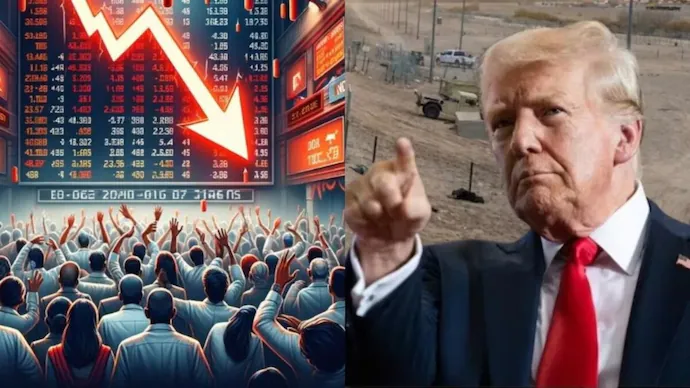Global financial markets continued their downward trend following the announcement by US President Donald Trump of sweeping tariffs on imports from over 180 countries and territories. The new tariffs range from 10% to over 50%, sparking widespread concern among investors and policymakers.
On Friday, markets fell further as China responded in kind to the US measures, escalating an already tense trade dispute. Beijing’s Ministry of Commerce announced that it would impose a 34% tariff on all US imports from 10 April, matching the US move.
Sharp losses across global markets
The intensifying trade standoff between the world’s two largest economies significantly impacted global markets. Germany’s DAX index saw a sharp drop of over 1,000 points—more than 5%—reaching a daily low of 20,590 points. This extended its weekly loss to approximately 8%, according to reports from German news agency dpa.
Tim Oechsner, a capital markets analyst at Steubing AG, described the situation as indicative of the current “high volatility” in financial markets.
European equities experienced some of the steepest declines. Major indices across the continent slid around 5%, with crude oil prices also falling to their lowest levels since 2021. Spain’s IBEX 35 index dropped by roughly 5% during Friday trading, hitting 12,500 points. Despite being more resilient earlier in the week—with only a 1.2% decline following the initial tariff announcement—the Spanish index eventually succumbed to pressure from the ongoing US-China trade dispute.
France’s CAC 40 index also suffered, falling by about 4.3%, contributing to what has been one of the most significant weekly losses for European markets in recent years.
Political reactions and calls for unity
French President Emmanuel Macron called on domestic companies to pause any new investments in the United States, urging a coordinated response. Similarly, Acting German Economy Minister Robert Habeck suggested that a united European approach could compel the US to reconsider its position.
However, France’s Finance Minister Eric Lombard urged caution. He warned against retaliatory tariffs, noting that such measures could ultimately harm European consumers.
EU Trade Commissioner Maroš Šefčovič held discussions with US Secretary of Commerce Howard Lutnick and US Trade Representative Jamieson Greer. “I made it clear that the US tariffs are harmful and unjustified,” Šefčovič posted on social media platform X. He added that while the EU remains committed to meaningful dialogue, it is also prepared to protect its economic interests.
US markets and commodities also affected
US markets were also hit hard by the tariff developments. The S&P 500 dropped by 322.44 points to 5,074.08—a decline of around 6%—marking its lowest close since March 2020 during the early stages of the COVID-19 pandemic. The Dow Jones Industrial Average fell by 2,231 points (5.5%), and the Nasdaq Composite lost 5.8%, falling more than 20% from its record high set in December.
The trade conflict has left few sectors untouched. Of the 500 companies listed on the S&P 500, shares in only 14 rose on Friday. Commodity prices also took a hit, with crude oil and copper both declining sharply due to concerns about the broader economic impact.
Despite the market turmoil, Trump defended the tariffs. He claimed on his social media platform, Truth Social, that China had miscalculated in its response: “CHINA PLAYED IT WRONG, THEY PANICKED – THE ONE THING THEY CANNOT AFFORD TO DO!” He acknowledged that Americans might experience “some pain” in the short term, but maintained that the long-term objective of revitalising US manufacturing made the policy worthwhile.
In remarks delivered on Thursday, Trump compared the current economic strain to a medical procedure, suggesting that conditions may deteriorate before any improvement is seen.
